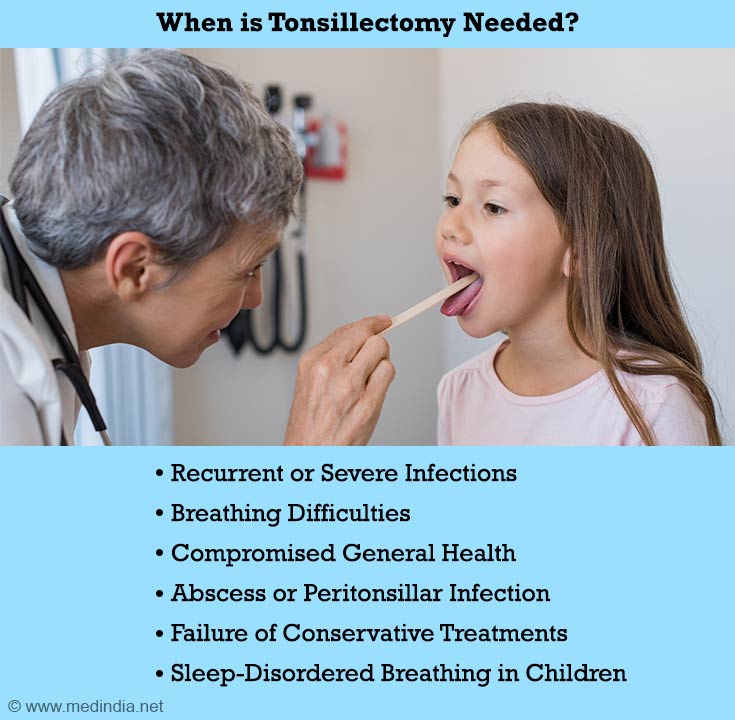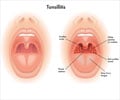- Tonsillectomy - (https://kidshealth.org/en/parents/tonsil.html)
About
Tonsillectomy, the surgical removal of the tonsils, is a common procedure recommended for various health conditions such as severe throat infections, sleep apnea, and breathing disorders. While generally considered safe and effective, it's crucial to weigh the risks and benefits before opting for this surgery.
To Know More About Tonsillectomy, Click Here
When is Tonsillectomy Needed?
Tonsillectomy, the surgical removal of the tonsils, is recommended under various circumstances when deemed medically necessary. Here are common scenarios when a tonsillectomy may be needed:(1✔ ✔Trusted Source
Tonsillectomy
Go to source)
Recurrent or Severe Infections
Tonsillectomy is often advised when an individual experiences frequent and severe throat infections that significantly impact their overall health. Chronic or persistent infections may necessitate the removal of the tonsils to prevent further complications.
Breathing Difficulties
Enlarged tonsils can contribute to breathing difficulties, especially during sleep. Conditions like sleep apnea, where breathing is interrupted during sleep, may be addressed through tonsillectomy. The removal of enlarged tonsils can improve airflow and alleviate breathing issues.
Compromised General Health
When tonsil-related issues seriously compromise a person's general health and well-being, a tonsillectomy may be recommended. This can include conditions where enlarged tonsils affect daily activities, hinder proper nutrition, or lead to persistent discomfort.

Abscess or Peritonsillar Infection
Tonsillectomy may be necessary in cases of recurrent peritonsillar abscesses or severe infections. These conditions, if left untreated, can pose risks and may require the surgical removal of the tonsils to prevent further complications.
Failure of Conservative Treatments
If conservative treatments, such as antibiotics for infections, fail to provide long-term relief, a healthcare provider may consider tonsillectomy as a more definitive solution to address chronic tonsil-related issues.
Sleep-Disordered Breathing in Children
Tonsillectomy is commonly performed on children with sleep-disordered breathing caused by enlarged tonsils. Persistent snoring, difficulty in breathing during sleep, and related issues may prompt the recommendation for tonsil removal.
Deciding on Tonsillectomy? Consult a Healthcare Provider
What are the Potential Risks of Tonsillectomy?
Bleeding
Tonsillectomy poses a risk of bleeding during or after the surgery. Proper postoperative care and adherence to medical guidelines are crucial to minimize this risk.
Infection
Surgical procedures always carry the risk of infection. In the case of tonsillectomy, precautions are taken to reduce the likelihood of postoperative infections.
Did You Know?
Tonsillectomy could lead to obesity in children after the surgical procedure.Anesthesia-related Adverse Effects
The use of anesthesia during tonsillectomy introduces potential risks. Discussing your medical history and concerns with the anesthesiologist beforehand can help mitigate these effects.
Postoperative Discomfort
After the surgery, individuals may experience discomfort, difficulty in swallowing, and the need for a soft diet. Adhering to postoperative care recommendations is essential for a smoother recovery.
Individual Variation
The extent of risks can vary from person to person based on factors such as age, overall health, and any underlying medical conditions. A personalized risk assessment is crucial.
Did You Know?
Tonsillectomy Complications in Adults are Higher Than Previously ThoughtPostoperative Recovery after Tonsillectomy
After a tonsillectomy, individuals may experience a few days of discomfort, difficulty swallowing, and the need for a soft or liquid diet. The duration of the recovery period can vary, but proper postoperative care, adequate sleep, and adherence to medical recommendations are crucial for a successful recovery.
Click Here to Know How to Manage Post-Tonsillectomy Pain in Children.
Pain Control
Effective pain control is a critical aspect of the healing process post-tonsillectomy. Healthcare practitioners may recommend or prescribe appropriate painkillers to manage postoperative discomfort. Proper pain management enhances the overall recovery experience.
Acupuncture may Help Manage Pain After Tonsillectomy. Click Here to Know More.
Management and Alternatives of Tonsillectomy
In certain cases, non-surgical alternatives, such as antibiotics for infections or continuous positive airway pressure (CPAP) therapy for sleep apnea, may be explored before opting for tonsillectomy. Conservative management options are carefully considered, and decisions about surgery are made after weighing all available options.
Personal Health Aspects
The safety of the tonsillectomy procedure is influenced by factors such as age, general health, and underlying medical conditions. Healthcare providers evaluate the patient's current state of health to determine the necessity of the operation. Tonsillectomy is often performed on younger patients, with decisions influenced by the frequency and severity of infections, sleep issues, and overall impact on general health.
Conclusion
In conclusion, tonsillectomy can be a safe and successful operation when medically necessary. However, it is crucial to make this decision after consulting with a trained healthcare provider. By carefully considering medical necessity, potential risks, postoperative recovery, pain control, and alternative options, individuals can make informed choices about their health and well-being.







